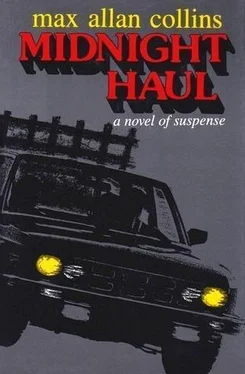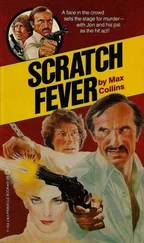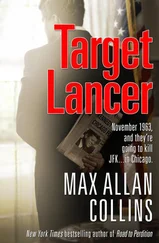The Mill was a late ’60s time warp. The booths were displaced church pews; stained-glass panels hung behind the bar; a folksinger was doing something by Phil Ochs. During the folksinger’s break, somebody put money in a jukebox that still had “Big Yellow Taxi” on it and when something by Sting came out, it seemed like a mistake. A waitress in sweater and jeans took an order, then spoke to her black boyfriend for five minutes before turning it in. Two guys with ponytails and facial hair sat facing each other, leaning across one of the tables scattered between the pews and the bar, making a conspiracy out of a dope deal as if anyone still cared, saying “man” a lot, like it was fifteen years ago in California, and not today in Iowa City.
Crane hated the Mill.
But his friend Roger Beatty and Roger’s girl Judy had talked him into coming along. The food at the Mill was good, particularly the antipasto salad, and afterwards they would go to the Bijou Theater for a John Wayne movie, The Searchers . Roger said it was a great movie, so Crane had consented to come. He hadn’t been out much since he got back from Greenwood. He hadn’t been out at all, really. Maybe it was time he did.
Roger was explaining some things about the movie to Judy, who was listening patiently, or pretending to. Judy usually didn’t go in for these old movies, and Crane wondered why she was here.
Judy was a thin, pretty girl with a short dark cap of hair and dark blue eyes with long lashes; she gave Crane a slow sideways look, while Roger babbled (“doorways in the film represent civilization”) and gestured with both hands, the eyes behind his thick glasses lost in themselves.
Their antipasto salads came, and they ate, Roger continuing his critique of the film they would be seeing, Crane beginning to feel uncomfortable with Judy’s eyes on him. He knew her well enough to know she wasn’t putting the make on him. So why was she staring?
Finally Roger, who liked food even more than films, shut up and ate.
Judy said, “I’m glad you’re getting out tonight, Crane. You needed it.”
He managed a smile. “Who needs to see a movie, with Roger here to tell it to you.”
Roger looked up from his salad. “I was just giving you some background.”
“Like the ending,” Judy asked, with a not unpleasant smirk.
Crane smiled at them and said, “It’s nice of you guys to ask me along. I haven’t been doing much lately except study.”
“Not that it shows,” Roger said.
Crane shrugged. “I missed a few deadlines.”
“Yeah, and had some pieces rejected.”
“What’s the problem, Crane?” Judy asked.
Roger said, “He’s going to lose his spot on the Daily Iowan , is the problem. You know how many journalism majors are lined up in back of you, Crane, wanting on that staff?”
“Just all of them,” Crane said.
“So what’s the problem?” Judy asked again.
“He’s still got his head back in New Jersey,” Roger said.
Crane didn’t say anything.
Their waitress brought the food: Roger had a small pizza, Judy spaghetti, Crane vegetarian lasagna.
Roger and Judy began to eat.
Crane poked at his food with his fork.
“Why don’t you call her?” Roger said.
“Roger. Please.”
“I know you don’t want to talk about it in front of Judy, but I already told her all about it.”
“Thanks, Roger. Confiding in you is like taking out an ad.”
Judy said, “Why don’t you call her, Crane? See what’s been happening? It’s been a month.”
“Five weeks,” he said.
“And you wrote her one letter and she didn’t answer it. That isn’t much of an effort to get through to her.”
“Who says I should try to get through to her?”
“Nobody,” Roger said. “But you better start getting with it.”
“Getting with it.”
“Yeah. Do your work. Have some fun. You know. Live a little.”
“Can I quote you?”
“Go ahead. Maybe if you use my stuff you won’t get rejected.”
Judy touched Roger’s arm and gave him a sharp look. Roger shook his head and took his frustration out on a slice of pizza.
Crane took a bit of lasagna: it was cold; he ate it anyway.
After the meal they had some wine and Crane said, “I know you two are trying to help, and I appreciate it. Really. I’m glad to be out among the living again. But your advice... well, it’s just that I’ve been over all of this in my own head so many times that...”
“Do you still think about Mary Beth?” Judy asked.
“Of course I still think about Mary Beth! I still sleep in the same bed I slept in with her, damnit.”
“From the way you just snapped at me,” Judy said, giving him her slow, long-lashed look, “I’d say you’ve got a bad case of the guilts.”
“The guilts.”
“That’s right. You went to your girlfriend’s funeral, and you met this Boone and went home with her. And you feel guilty about it, and that’s why you haven’t made any real effort to get back in touch with her. You’re punishing yourself.”
“Judy, I know you mean well, but you just don’t understand.”
“Maybe not. But I’d like to. So would Roger.”
Crane didn’t say anything.
Neither did Judy or Roger, for a few long minutes.
Then Crane said, “All right, maybe I do feel guilty about Boone and me, getting together so soon after what happened to Mary Beth...” He shook his head. “But that isn’t what... you see, what came between Boone and me was the goddamn Kemco thing. I couldn’t get her to accept that Mary Beth’s death was really suicide.”
“It probably was,” Judy said, nodding.
“What probably was?”
“Mary Beth’s death. It probably was suicide. I agree with you.”
“That sounds like an expert opinion.”
“Well, maybe it is. When Roger started talking about all this, telling me some of what you told him about the Kemco situation, I did some reading up. They make Agent Orange at that plant, don’t they?”
“Yes.”
“So we’re talking dioxin, among other goodies.”
“That’s right.”
“Keep it simple,” Roger interrupted, between sips of red wine. “We’re not all science majors, here, you know.”
Judy said, “Three ounces of dioxin in the New York City water supply could wipe out the city’s population. At Love Canal — you’ve heard of Love Canal, Roger? At Love Canal, they buried 130 pounds of the stuff.”
“Judas,” Roger said.
“Here’s the point, Crane,” Judy continued. “In addition to being one terrific carcinogen, and the bearer of such glad tidings as liver disease and miscarriages, dioxin can cause psychological disturbances. And what is a suicide victim, other than a psychologically disturbed person?”
“Very few well-balanced folks kill themselves,” Roger conceded.
Crane leaned forward. “Then the depressed state Mary Beth and the other suicides were in might’ve been brought on... or anyway, amplified... by chemicals they’d been exposed to?”
“Why not?” Judy asked. “They all worked at that plant, didn’t they? Now if a non -Kemco employee in Greenwood committed suicide — particularly somebody who’d been asking embarrassing questions around town, like you had — that would be suspicious. Then I’d be inclined to agree with your Boone that people were being murdered to look like suicide.”
“There’s something I don’t get,” Roger said. “The Kemco plant is twenty miles or so from Greenwood, right? Then why the high rate of illnesses and such among the families of employees? The families aren’t directly exposed to any Kemco pollution.”
Читать дальше












